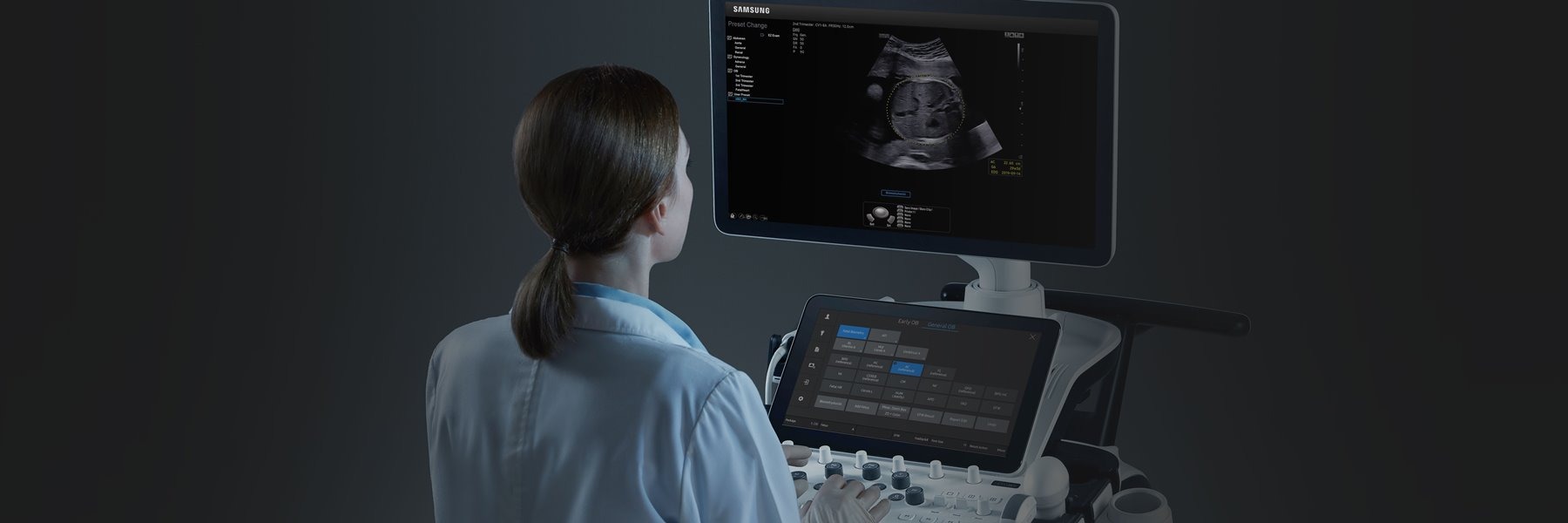
What’s New: Samsung Medison and Intel are collaborating on new smart workflow solutions to improve obstetric measurements that contribute to maternal and fetal safety and can help save lives. Using an Intel Core i3 processor, the Intel Distribution of OpenVINO toolkit and OpenCV library, Samsung Medison’s BiometryAssist automates and simplifies fetal measurements, while LaborAssist automatically estimates the fetal angle of progression (AoP) during labor for a complete understanding of a patient’s birthing progress, without the need for invasive digital vaginal exams.
“Samsung Medison’s BiometryAssist is a semi-automa1ted fetal biometry measurement system that automatically locates the region of interest and places a caliper for fetal biometry, demonstrating a success rate of 97% to 99% for each parameter. Such high efficacy enables its use in the current clinical practice with high precision.”
— Professor Jayoung Kwon, MD PhD, Division of Maternal Fetal Medicine, Department of Obstetrics and Gynecology, Yonsei University College of Medicine, Yonsei University Health System in Seoul, Korea
Why It’s Needed: According to the World Health Organization, about 295,000 women died during and following pregnancy and childbirth in 2017, even as maternal mortality rates decreased. While every pregnancy and birth is unique, most maternal deaths are preventable. Research from the Perinatal Institute found that tracking fetal growth is essential for good prenatal care and can help prevent stillbirths when physicians are able to recognize growth restrictions.
“At Intel, we are focused on creating and enabling world-changing technology that enriches the lives of every person on Earth,” said Claire Celeste Carnes, strategic marketing director for Health and Life Sciences at Intel. “We are working with companies like Samsung Medison to adopt the latest technologies in ways that enhance the patient safety and improve clinical workflows, in this case for the important and time-sensitive care provided during pregnancy and delivery.”
How It Works: BiometryAssist automates and standardizes fetal measurements in approximately 85 milliseconds with a single click, providing over 97% accuracy. This allows doctors to spend more time talking with their patients while also standardizing fetal measurements, which have historically proved challenging to accurately provide. With BiometryAssist, physicians can quickly verify consistent measurements for high volumes of patients.
“Samsung is working to improve the efficiency of new diagnostic features, as well as healthcare services, and the Intel Distribution of OpenVINO toolkit and OpenCV library have been a great ally in reaching these goals,” said Won-Chul Bang, corporate vice president and head of Product Strategy, Samsung Medison.
During labor, LaborAssist helps physicians estimate fetal AOP and head direction. This enables both the physician and patient to understand the fetal descent and labor process and determine the best method for delivery. There is always risk with delivery and a slowing progress could result in issues for the baby. Obtaining more accurate and real-time progression of labor can help physicians determine the best mode of delivery and potentially help reduce the number of unnecessary cesarean sections.
“LaborAssist provides automatic measurement of the angle of progression as well as information pertaining to fetal head direction and estimated head station. So it is useful for explaining to the patient and her family how the labor is progressing, using ultrasound images which show the change of head station during labor. It is expected to be of great assistance in the assessment of labor progression and decision-making for delivery,” said Professor Min Jeong Oh, MD, PhD, Department of Obstetrics and Gynecology, Korea University Guro Hospital in Seoul, Korea.
BiometryAssist and LaborAssist are already in use in 80 countries, including the United States, Korea, Italy, France, Brazil and Russia. The solutions received Class 2 clearance by the FDA in 2020.
What’s Next: Intel and Samsung Medison will continue to collaborate to advance the state of the art in ultrasounds by accelerating AI and leveraging advanced technology in Samsung Medison’s next-generation ultrasound solutions, including Nerve Tracking, SW Beamforming and AI Module.
Source: Company Press Release






